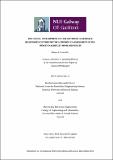| dc.contributor.advisor | Ó Laighin, Gearóid | |
| dc.contributor.author | Lowe, Shane Alan | |
| dc.date.accessioned | 2014-04-07T13:34:23Z | |
| dc.date.issued | 2013-12-23 | |
| dc.identifier.uri | http://hdl.handle.net/10379/4271 | |
| dc.description.abstract | Functional ability describes a person's capability to perform those tasks that
are necessary to live independently. It is a proven predictor of functional decline,
the need for hospitalisation and institutionalisation and for morbidity and
mortality. For this reason, assessment of functional ability has been integrated
into standard geriatric care. These assessments are typically performed using
questionnaires or observation of the patient and rarely integrate information and
communications technology. Devices that monitor a person's performance of activities
of daily living have begun to be introduced but have not gained widespread
traction in clinical assessment practice.
This thesis describes the development and validation of a wearable device
for the contextualised monitoring of the performance of activities of daily living.
This device is specifically designed to be useful in the domain of functional assessment.
Algorithms to combine a range of parameters monitored by the device
into a clinically meaningful output are developed and validated. This output is
designed to require the minimum possible change in clinical practice.
The set of studies described in this thesis test the validity of the data generated
by the device in terms of sensitivity and specificity. This testing was performed
by comparing device output with video of participants performing activities
of daily living in real time. The algorithms used to generate clinically meaningful
data were validated in comparison to conventional questionnaire based
assessments. Data were also collected on older adults wearing the device in an
assisted living facility over a two week period.
Results indicated that the device developed in this thesis is an accurate platform
for the monitoring of activities of daily living. The data regarding outputs
for functional health assessment indicate that the device may perform valid assessments
for three different domains of functional health i.e Mobility, Disability
and Risk of hospitalisation. Furthermore participants indicated that with slight
modifications the device would be acceptable for long term use. | en_US |
| dc.rights | Attribution-NonCommercial-NoDerivs 3.0 Ireland | |
| dc.rights.uri | https://creativecommons.org/licenses/by-nc-nd/3.0/ie/ | |
| dc.subject | Activity | en_US |
| dc.subject | Behaviour | en_US |
| dc.subject | Functional health | en_US |
| dc.subject | Older adults | en_US |
| dc.subject | Accelerometer | en_US |
| dc.subject | Bioelectronic Research Cluster | en_US |
| dc.subject | National Centre for Biomedical Engineering Science (NCBES) | en_US |
| dc.subject | Electrical & Electronic Engineering | en_US |
| dc.title | The Design, Development and Validation of a Wearable Behaviour Monitor for the Autonomous Assessment of the Functional Health of Older Adults | en_US |
| dc.type | Thesis | en_US |
| dc.contributor.funder | IRCSET | en_US |
| dc.local.note | The thesis describes the development and validation of a device and associated algorithms designed to predict oncoming degradations of functional health based on activity and behavioural data. The technical development as well as initial validation through human trials are described. | en_US |
| dc.description.embargo | 2016-12-11 | |
| dc.local.final | Yes | en_US |
| nui.item.downloads | 175 | |


